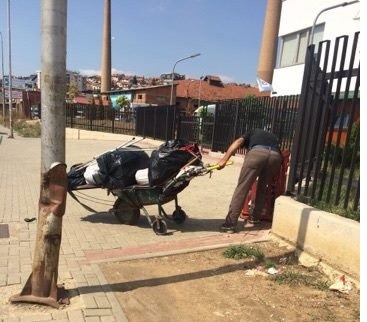You can find 64-year-old Rrahim Kurteshi from Fushë Kosova spending time near garbage containers every day. He earns a living by gathering scrap metal (recyclable materials). The temperature outside and the negative effects on his health don’t matter much to Kurteshi, because according to him, he has to get money for food somehow.
Kurteshi gathers his materials from dumpsters, mainly cans, plastic bags, and sometimes metal. He sends these materials to some private companies who classify and export scrap.
“I have been gathering scrap inside of dumpsters since I was a little child. My family’s financial status was not good and I had to get money somehow. Today this is what I do for a living because I was not able to find any other job. I usually fill 2-3 bags a day and gain a maximum of 7 Euros. I buy food with this money every day and some basic elements without which we cannot live,” says Kurteshi.
He says that he works individually and doesn’t have any agreement with private companies that gather scrap.
Muhamet and Muharrem, two 13-year-old twin brothers, travel from Fushë Kosova to Prishtina every day to collect scrap. They say that neither of them goes to school because nobody in their family works and they have a bad financial status. Both of them try to help their family by collecting scrap.
“When we were seven years old we went into dumpsters to collect trash. We go out like this every day, sometimes we walk from Fushë Kosova, and sometimes when we have money we take the bus. We go out early in the morning and gather scrap until the evening, we then sell them to some companies. We give the money we make to our father and he buys food with it,” says Muhamet.
According to Abaz Xhigolli, director of the Center for Social Work, there are 281 families from the Ashkali community that receive social welfare, 53 families from the Roma community and 37 families from the Egyptian community.
Ahmet Jashari, another scrap gatherer, says that he gathers recycled materials every day and has a multi cultivator, a vehicle that helps him transport his scrap from one place to another, so he can visit several Prishtina neighborhoods in a day and gather as much scrap as possible. Jashari tells how he gathers scrap on his multi cultivator every day. He sends it home and classifies it and at the end of the week he sends it to private companies.
“I go out to gather scrap every day, I fill the bags and take them home, then I classify each of them separately — cans, plastic bags, metal and plastic bottles. After that I sell them to the nearest company at the end of the week and get 35-40 Euros. We make a living with that money,” says Jashari.
Individual scrap collectors sell scrap at minimal cost to companies. They sell one kilo of plastic for 0.13 Euros, metal for 0.14 Euros, nylon for 0.15 Euros and cans for 0.35 Euros. However, these companies did not agree to share how much money they make for a kilo of each of these recyclable materials.
Referring to the research from Preportr, called “Earning their daily bread,” the company that exports the most scrap is “Nderimi sh.p.k.” It has exported 116,196,917.00 kilos of scrap amounting to 21,821,528.00 Euros. Other companies like “Metal-Mix,” “Euro-Steel” and “Euro Abi” export large quantities of scrap as well.
In neighboring countries, the price for recyclable materials is more or less the same.
As an example, during 2010-2015, one kilo of plastic in Macedonia cost 0.29 Euros to export, in Serbia it cost 0.28 Euros, and in Montenegro 0.33 Euros. Plastic costs less to export from Albania, with a price of 0.13 Euros per kilo.
However, in other countries exporting recyclable materials costs a lot more. In Switzerland, the price to export plastic is 6.00 Euros per kilo and in Sweden it’s 3.30.
KosovaLive contacted scrap companies in Kosovo but they did not answer by phone, e-mail or any other form of communication.
According to Adriatik Stavileci, media official at Kosovo Customs, in 2016 alone, over 67,8 million kilos of scrap had been exported, amounting to 11 milion Euros, while during the first six months of 2017, over 61 million kilos of scrap, amounting to 11.5 million Euros, were exported.
During 2016 and 2017, Kosovo exported over 22 million Euros worth of scrap in total. The scrap is usually exported to Albania and Macedonia.
Besarta Breznica








